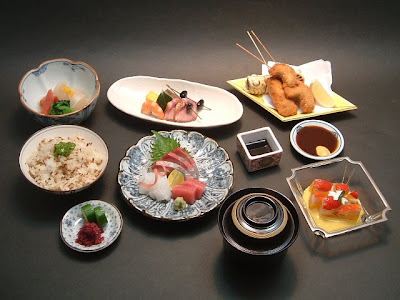Why Aren't Japanese People Fat?
Replies
-
The book I mentioned earlier describes both the Japanese eating patterns and those of Okinawans, but focuses on Okinawans.
If you googled "longest vital years" you'll find a lot of references which will guide you to info. on the correlation between diet/health/longevity.
And, above all 'vital years"...which means living to a great old age still mentally sharp and physically active.
Maybe the simplest explanation: Japanese do not eat the way Americans do.
The Japanese also don't drive as much as Americans, walk more than most Americans, have a different culture and genetics than most Americans....it's not really simple.0 -
Going a little of topic here, one of my best friends is Japanese, he also has a BMI of like 18.0, putting him at underweight, so this whole post cracks me up.0
-
Great article.
Japanese people eat ALL the food. Just less of it!0 -
The article is spot on. I live in Japan for a year now and from the very beginning I was surprised with their food, it's not that 'healthy'. Then I went for a trip to the US and I was really shocked with the portion sizes. Japanese portions look like this

Compare that with
Edit: I'm too lazy to resize, sorry for the huge image. It actually helps with the point I'm trying to make though
Yep! Those images sums it all!0 -
My ex sister in law is japanese and she could eat 3 helpings of what we had and still be stick thin. I just hope that one day, or in another life, it comes back to bite her. That's the only way I can think it's fair.....:sick:
That's what she ate in front of you. As I'm sure you weren't with her 24/7, I'm willing to bet that she consumed less calories overall. Like, she ate those 3 portions, but nothing else that day or just less during the week (calorie cycling).0 -
BTW, there is a great deal of information on this all over the web... Just search for Japanese diet vs. American diet.0
-
My ex sister in law is japanese and she could eat 3 helpings of what we had and still be stick thin. I just hope that one day, or in another life, it comes back to bite her. That's the only way I can think it's fair.....:sick:
That's what she ate in front of you. As I'm sure you weren't with her 24/7, I'm willing to bet that she consumed less calories overall. Like, she ate those 3 portions, but nothing else that day or just less during the week (calorie cycling).
I agree. A lot of my skinny friends, sometimes the portion they eat is HUGE, but since they are not "dieting", say that night they might skip dinner coz they are full, and then the next day they would just nibble on small portions coz they are still stuffed from the day before. But for people "dieting" they have (well I have) a dangerous mindset of all or nothing, so a big portion spirals in to binges or days of overeating..0 -
The article is spot on. I live in Japan for a year now and from the very beginning I was surprised with their food, it's not that 'healthy'. Then I went for a trip to the US and I was really shocked with the portion sizes. Japanese portions look like this

Compare that with
Edit: I'm too lazy to resize, sorry for the huge image. It actually helps with the point I'm trying to make though
Yep! Those images sums it all!
While I can identify everything in the kaiseki meal, I can't even begin to figure out what that crap is in the second photo.
Is that even food?0 -
I went to Japan 8 years ago. Here are some things I observed:
In 2004, before the anti-soda thing really got going with Americans, I observed my young Japanese buddies drinking NO SODA. They actually drank green tea with every meal, and between meals (which in those amounts rev your metabolism).
They biked and walked all over the place, even in the big cities, and even the little old ladies.
They ate teeny tiny breakfasts. I almost fainted.
Judo/karate was popular with my friends. Don't know if that was true of most young Japanese.
I hardly ever saw bread, red meat, or potatoes, or cheese.
Seafood.
Socializing doesn't seem to revolve around food like it does in America. We went to the onsens, we drank tea, we walked in the park, went to the dojo, hung out at the plaza - it wasn't like we socialized by stuffing our faces with cheezy appetizers and sugary cocktails.
The Japanese CAN PARTY and I think they are delightful. But they seem to practice restraint and discipline to the extent that it seems like second nature to them. You don't see a lot of Japanese folks at the store at 2pm wearing salsa-stained sweatpants.0 -
There is plenty of red meat here. Ever heard of yakiniku? I think the biggest thing is there are not many drive thrus and prices are expensive for eating out. McDonalds is $10 for a meal. They have no $1 burgers.
Also plenty of bakeries selling bread, rolls, muffins, hot dogs, pizzas. Potatoes? There are pototoes in the curry that they eat plentifully. Also fried mashed potatoes at every 7-11, Family Mart, and grocery store.
Don't make assumptions that all Japanese eat are fish.0 -
BTW, there is a great deal of information on this all over the web... Just search for Japanese diet vs. American diet.
How many times are you going to post without reading the article or responses to your other posts? Or maybe you have read them but don't wish to address them?0 -
My brother has lived in Japan for more than half his life. His wife is Japanese. Neither of them are fat but my brother still has to watch his weight as he, like most of our family, has a propensity for gaining weight. My SIL doesn't have that problem.0
-
Even without reading the article, it's simple. Eat smaller portions AND eat your veggies! The Japanese diet is rich in vegetables and nutrient rich food like seaweed. It's ridiculous how good seaweed is for you. Also, like most Asian diets, it lacks something we eat like crazy here: dairy. Most of the world can't metabolize dairy products anyway and here in the US we consume something like 30lbs of cheese yearly which is basically fat. Also, large amounts of dairy isn't good for things like osteoperosis and other bone diseases because dairy has a ton of protein which leaches calcium not only from your bones, but your blood stream as well. In other words, go easy on the dairy.
If you need to see what nutrition is recommended go to www.myplate.gov and it has redone dietary standards as opposed to the old food pyramid. Also, www.goveg.com is a great website for the vegan/vegetarians out there.0 -
False. Japanese have aisles of different flavored yogurts and they even sell fruit jelly pouches made to add to plain yogurt to give it whatever flavor you want. Personally I like the prune flavored one.
I almost forgot.. another huge hit is smoothies and strawberry milk.0 -
Even without reading the article, it's simple. Eat smaller portions AND eat your veggies! The Japanese diet is rich in vegetables and nutrient rich food like seaweed. It's ridiculous how good seaweed is for you. Also, like most Asian diets, it lacks something we eat like crazy here: dairy. Most of the world can't metabolize dairy products anyway and here in the US we consume something like 30lbs of cheese yearly which is basically fat. Also, large amounts of dairy isn't good for things like osteoperosis and other bone diseases because dairy has a ton of protein which leaches calcium not only from your bones, but your blood stream as well. In other words, go easy on the dairy.
LOL at the dairy scare
Japanese milk is the creamiest I've ever tasted. I'm spoilt for life now.0 -
I've lived in Asian countries and I've seen all this before, but when it comes to what people actually eat on a regular basis, it doesn't look like that. My students ate a ton of food with veggies, drank hot soymilk for breakfast, and went easy on the crap. The way meals are planned out is also different and aides to health like the combining of meats, vegetables, starches, hot, spicy and cold dishes. They all work together to give you a more complete meal.0
-
Japanese milk is the creamiest I've ever tasted. I'm spoilt for life now.
Me too! The strawberry milk is my favorite! Nesquick taste like crap.0 -
I have lived in Japan for the past 7 years and there are fat Japanese people. I work in healthcare and diabetes is on the rise here as well. Mostly thanks to the western diet. Also contrary to popular belief there is a lot of fat in many Japanese foods, especially the meat. However, their portion sizes are much smaller, most Japanese people (especially in the city) don't own a car so even if they commute by train they have to walk to the train, to the office, to the grocery store. In other words they aren't just going from their desk job to the car to the couch.0
-
One word, SUMO!0
-
Bumping to read later.0
-
bump0
-
I love this article plus the writer's wry tongue-in-cheek humor. I spent a few years of my childhood in Japan, Hong Kong, and Malaysia, and I definitely don't remember seeing very many overweight people. The sumo wrestlers don't count!
Personally, I'd like to tweak my brain into self-shaming so I stay in check. But who will be my standard? Definitely not my "huggable" next door neighbor, nor my favorite friend who has "a few extra pounds."0 -
Every argument is invalid - sumo comes from Japan.
\m/0 -
Even without reading the article, it's simple. Eat smaller portions AND eat your veggies! The Japanese diet is rich in vegetables and nutrient rich food like seaweed. It's ridiculous how good seaweed is for you. Also, like most Asian diets, it lacks something we eat like crazy here: dairy. Most of the world can't metabolize dairy products anyway and here in the US we consume something like 30lbs of cheese yearly which is basically fat. Also, large amounts of dairy isn't good for things like osteoperosis and other bone diseases because dairy has a ton of protein which leaches calcium not only from your bones, but your blood stream as well. In other words, go easy on the dairy.
If you need to see what nutrition is recommended go to www.myplate.gov and it has redone dietary standards as opposed to the old food pyramid. Also, www.goveg.com is a great website for the vegan/vegetarians out there.
Do you have any scientific articles or peer review studies proving that dairy leaches calcium from the bones? I'd like to read them please. All I can find are articles and blog written by vegan.0 -
Even without reading the article, it's simple. Eat smaller portions AND eat your veggies! The Japanese diet is rich in vegetables and nutrient rich food like seaweed. It's ridiculous how good seaweed is for you. Also, like most Asian diets, it lacks something we eat like crazy here: dairy. Most of the world can't metabolize dairy products anyway and here in the US we consume something like 30lbs of cheese yearly which is basically fat. Also, large amounts of dairy isn't good for things like osteoperosis and other bone diseases because dairy has a ton of protein which leaches calcium not only from your bones, but your blood stream as well. In other words, go easy on the dairy.
If you need to see what nutrition is recommended go to www.myplate.gov and it has redone dietary standards as opposed to the old food pyramid. Also, www.goveg.com is a great website for the vegan/vegetarians out there.
Lactose intolerance =/= dairy intolerance. In fact, cheese and yogurt were pretty much created for two purposes, spoilage prevention, and to remove lactose (neither cheese nor yogurt have lactose in them, as the bacteria used in the creation of both foods feed on the lactose and eliminate it.) This is why my wife will get sick from drinking a glass of milk, but can (and sometimes does) eat cheese and yogurt all day with no issues.
And for the record, cheese and milk are both pretty common in Japan. Roughly 90% of Japanese households consume dairy as a staple food. Maybe next time you should read the article, so you may actually be educated about what you are saying, rather than just making up stuff you know nothing about.0 -
My ex sister in law is japanese and she could eat 3 helpings of what we had and still be stick thin. I just hope that one day, or in another life, it comes back to bite her. That's the only way I can think it's fair.....:sick:
That's what she ate in front of you. As I'm sure you weren't with her 24/7, I'm willing to bet that she consumed less calories overall. Like, she ate those 3 portions, but nothing else that day or just less during the week (calorie cycling).
I agree. A lot of my skinny friends, sometimes the portion they eat is HUGE, but since they are not "dieting", say that night they might skip dinner coz they are full, and then the next day they would just nibble on small portions coz they are still stuffed from the day before. But for people "dieting" they have (well I have) a dangerous mindset of all or nothing, so a big portion spirals in to binges or days of overeating..
A bit off-topic from the Japanese, but on topic overall why some people never seem to get fat even though they appear to eat more than you:
Yep, I'm like that. Now that I'm a bit older, I have some accumulated fat to lose, but I am still "slim" overall. Reminds me of Lyle McDonald's article on how it's usually not true when guys say they have eaten like crazy and still can't gain. Their bodies self-regulate.
"Almost invariably, when you track these big eaters, they really aren’t eating that much. Research has routinely shown that overweight individuals tend to under-estimate food intake (e.g. they think they are eating much less than they actually are) but in my experience ‘hardgainers’ are doing the opposite: vastly overestimating how much they are actually eating in a given day, or over the span of a week.
Similarly, although such trainees may get in a lot of food acutely, invariably they often compensate for those high-caloric intakes by lowering calories on the following day (or even in the same day). So while they might remember that one big-assed lunch meal, they won’t remember how they ate almost nothing later in the day because they got full."
http://www.bodyrecomposition.com/muscle-gain/muscle-gain-mistakes.html0
This discussion has been closed.
Categories
- All Categories
- 1.4M Health, Wellness and Goals
- 398.5K Introduce Yourself
- 44.7K Getting Started
- 261K Health and Weight Loss
- 176.4K Food and Nutrition
- 47.7K Recipes
- 233K Fitness and Exercise
- 462 Sleep, Mindfulness and Overall Wellness
- 6.5K Goal: Maintaining Weight
- 8.7K Goal: Gaining Weight and Body Building
- 153.5K Motivation and Support
- 8.4K Challenges
- 1.4K Debate Club
- 96.5K Chit-Chat
- 2.6K Fun and Games
- 4.8K MyFitnessPal Information
- 18 News and Announcements
- 21 MyFitnessPal Academy
- 1.5K Feature Suggestions and Ideas
- 3.2K MyFitnessPal Tech Support Questions

















